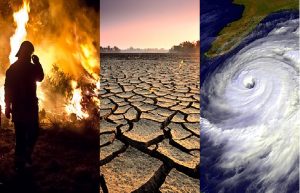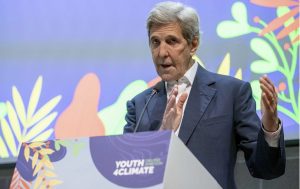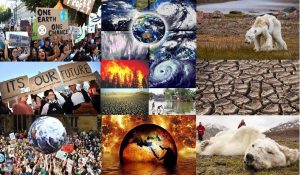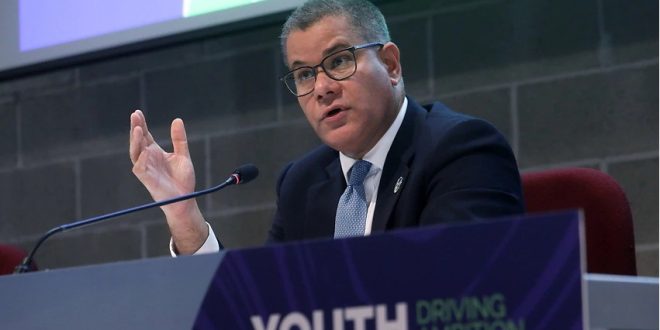03-10-2021
EDINBURGH: The world’s major economies must do more at the upcoming United Nations COP26 climate summit in Scotland to show they are serious about wanting to tackle global warming and heed the warnings of young activists, policymakers said on Saturday.
 COP26 President Alok Sharma said there was renewed urgency in the climate debate following preparatory talks in Milan where thousands of youth activists, including Greta Thunberg, urged governments to match words with action and stump up billions of dollars to wean the world off fossil fuels.
COP26 President Alok Sharma said there was renewed urgency in the climate debate following preparatory talks in Milan where thousands of youth activists, including Greta Thunberg, urged governments to match words with action and stump up billions of dollars to wean the world off fossil fuels.
“We had a very constructive set of discussions and there was a real sense of urgency in the room,” Britain’s Sharma told reporters after the meeting in Italy’s financial capital.
The COP26 conference in Glasgow aims to secure bolder climate action from the nearly 200 countries that signed the 2015 Paris agreement and agreed to try to limit global warming to 1.5 degrees Celsius (2.7 degrees Fahrenheit) above pre-industrial levels.
Sharma said delegates in Milan agreed to do more to keep the 1.5C target within reach and deliver on a $100bn per year pledge to help the most vulnerable nations confront climate change.
“The energy that came forward from the (youth) did galvanize the ministers,” Sharma said. “As we go forward in the next few weeks and into the COP, we must always keep (their) voices … in our minds.”
 New energy and funding pledges from the United States and China have raised negotiators’ hopes, but many G20 countries including leading polluters such as China and India have yet to announce updates of their short-term climate plans.
New energy and funding pledges from the United States and China have raised negotiators’ hopes, but many G20 countries including leading polluters such as China and India have yet to announce updates of their short-term climate plans.
Sharma said national action plans needed to include more ambitious targets for emissions reduction.
‘The decisive decade’
US climate envoy John Kerry also urged big economies to commit to more radical policies.
“We now have about 55 percent of global GDP (gross domestic product) committed to undertake tracks that will hold the temperature to 1.5 degrees,” he said.
Wealthy nations pledged about 10 ago to mobilize $100bn a year to help vulnerable countries adapt and transition to cleaner energy, but they are still short of their 2020 goal.
“The bottom line is, folks, as we stand here today, we believe we can make enormous progress in Glasgow, moving rapidly towards the new goals that the science is telling us we must achieve,’’ Kerry said.
 That means achieving a 45 percent reduction in carbon emissions in the next 10 years. “This is the decisive decade,” Kerry said.
That means achieving a 45 percent reduction in carbon emissions in the next 10 years. “This is the decisive decade,” Kerry said.
However, he noted, the sum of all 191 submissions as they are currently written would increase emissions between now and 2030 by 16 percent.
Financing climate action will be vital to the success of COP26, said Oscar Soria, campaign director at the US-based activist network Avaaz who was in Milan for the talks.
“Developing and developed nations should urgently sit together to design a plan. Without real money at the table it will be difficult to build trust in the negotiations in Glasgow,” Soria said.
Failure to act
The 2015 Paris accord committed nations to limit global warming to “well below” 2C (3.6F) through sweeping emissions cuts and to gun for a safer cap of 1.5C but in the six years since the landmark deal, greenhouse gas emissions have continued to rise along with disasters such as drought, flooding and storms supercharged by rising temperatures.
“I do not underestimate the amount of work which is required,” Sharma told reporters.
 “There was a consensus we need to collectively do more … and a number of parties pointed out it’s on all of us but particularly for the G20 nations”, which produce 80 percent of all manmade emissions.
“There was a consensus we need to collectively do more … and a number of parties pointed out it’s on all of us but particularly for the G20 nations”, which produce 80 percent of all manmade emissions.
“Everybody acknowledges that Glasgow is likely to be a critical point for setting ambition for the next decade,” Sharma said.
There are several potential sticking points for COP26 delegates.
As well as finalizing the Paris deal “rulebook” including rules governing carbon market and unified reporting timeframes countries need to redouble their efforts to slash carbon pollution.
However, an assessment last month showed even the most up-to-date national emissions cutting plans known as nationally determined contributions, or NDCs put Earth on course to warm a “catastrophic” 2.7C this century.
‘The survival of humanity’
Some signatories to Paris, notably Russia and Saudi Arabia, have been openly reticent to endorse the 1.5C goal, preferring instead to emphasize the “well below” 2C target.
 Without taking names, Kerry on Saturday said “‘well below’ means well below, contrary to some who are trying to assert that 2C was the target”.
Without taking names, Kerry on Saturday said “‘well below’ means well below, contrary to some who are trying to assert that 2C was the target”.
“The common-sense meaning of that is that it’s not 1.9 or 1.8, or 1.7C.”
Frans Timmermans, the European Union’s deputy climate chief, said he expected major emitters India and China to submit more ambitious climate plans in the run-up to Glasgow.
“There can be no doubt in anybody’s mind that we are fighting for the survival of humanity and that the climate crisis and the threat of ecocide are the biggest threats humanity faces,” he said.
“The world is really coming to terms with the fact that we need to act and act now, and I expect also India and China to make a substantial contribution to keep us within reach of 1.5C.”
Andreas Sieber, policy coordinator at the Climate Action Network, said in order for Glasgow to get off on the right foot, a forthcoming climate finance plan “must show how developed countries will meet and exceed the promise of $100bn in climate finance”. (Int’l Monitoring Desk)
 Pressmediaofindia
Pressmediaofindia




